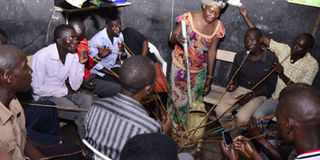Mother of eight going it on her own

Kiwanuka serving some of her clients. She settled for brewing local gin to provide for her eight children whose father does nothing to help. PHOTO BY ALEX ESAGALA.
If you ask the Iteso people of Uganda to host a social function, you can bet ajon, a local brew, will be on the menu.
Indeed, whereas many other indigenous Ugandans are steadily ‘graduating’ to factory-brewed beers and spirits, the Iteso continue to sip their malwa with pride.
We reached Cotilda Kiwanuka’s home in Kamokya, a city suburb in Kampala, close to midday. Under the scorching sun, the quiet seemingly calm neighborhood, a strong smell of the local brew, ajon, welcomed us.
She had devoted her entire concentration in a room where she was moving up and down attending to her customers who were ordering for the drink in different quantities.
Kiwanuka, smiling, comes out to the room which also acts as the serving area with three chairs for us to sit and have our meeting.
Populary known in the area as Aunty Coty, 44-year-old Kiwanuka is a single mother of eight. She takes care of her six sons and two daughters by selling malwa.
In the business for 10 years
Kiwanuka has sold malwa for 10 years. “My parents were Malwa brewers too and I saw them earn from it and learnt the trade too.”
Initially, Kiwanuka made samosas and pancakes that she supplied to various schools with the help of a boda boda rider. But she concluded that too much time spent over the fire might affect her health so she resorted to brewing.
“We have grown up seeing Kiwanuka sell malwa. She had to fend for herself after the husband stopped helping with their children. She is a hardworking woman,” narrates Aisha Nanozi, who has known Kiwanuka for seven years now.
Kiwanuka was lucky to have a place to do her business; all she needed were the necessities for making the brew. “I started with Sh40,000, which gradually made returns and I could make two big drums of malwa every day,” she narrates. She makes money the whole week but mostly in the evenings and weekends.
Benefits derived
Kiwanuka has been able to keep her children in school. “I have been able to acquire a plot of land in Wakiso where I would like to plant maize and wheat so that I do not have to buy the raw materials for the business,” she shares.
A Senior Two dropout, Kiwanuka also says she has built some houses for rent and has expanded her business to sell in the Kampala suburbs of Nakulabye and Kitukutwe, a village in Wakiso District. “My biggest challenge has become credit clients who disappear once their debts hit Sh20, 000,” she says.
Disservice to community?
Kiwanuka says in the past, malwa had always been perceived as a drink that only makes people turn away from their responsibilities and associated with time wastage but this is no longer the case lately.
“Many people associate malwa drinkers with idleness and poverty but this is not the same story today. People consume malwa in serious groups of development where they converge to save in their respective saving groups, share ideas and come up with solutions, plan weddings among other things,” Kiwanula defends her trade.
Future plans
“I want to buy land in the various parts of Kampala so that I can start building rental houses and start investing in the real estate business.
In addition, Kiwanuka plans to expand her business and open up more joints in different places around Kampala to have more money and she has confidence that it will work out since she has tried it out and the results have been positive.
Business success tips
Kiwanuka says she values her customers and rendering them the best services is what she looks up to a lot.
“I ensure cleanliness at my premises all the time and make it a point to make the drink ready and available for the customer at the time they need it since my customers have no specific period of the day they consume it,” she says.
Sharing her success
Due to her earned popularity in the area, Kiwanuka heads a community women group there and she uses her free time to engage them in different developmental income-generating projects.
“I chair the Makula Women’s group, which aims at empowering women through setting goals to help each other in case there is need to intervene,” she explains.
She says the group has been in place for seven years and it is composed of 20 women who learn from one another important aspects such as saving, helping one another and living harmoniously with friends.
“We also engage counsellors in our activities so as they help nurture us without running away from our marital responsibilities,” she adds.
Advice to women
To other women, Kiwanuka shares:
“Engage in starting up your own income-generating activities and put an end to waiting for your husbands to provide for you. The women who are still dreaming that it has to be the men providing for them all the time need to wake up and know that fending for the family can also be done by a woman. Women too can pay fees!”




